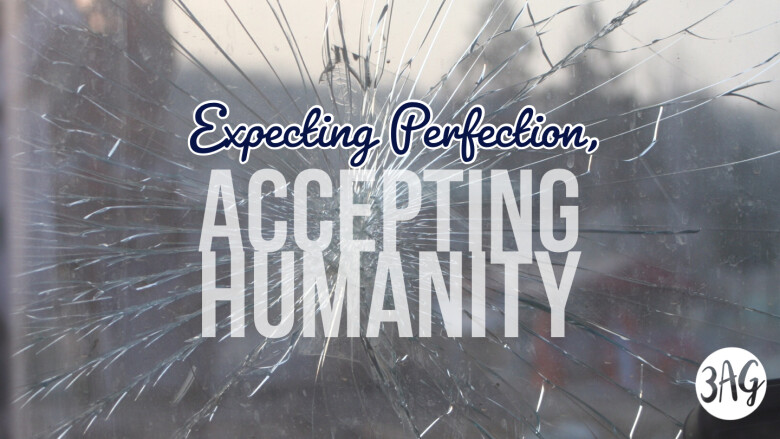What we are
1 Timothy 1:12-17
Expecting Perfection, Accepting Humanity – Part 1
March 17, 2019
Since September, we have been through two sermon series relating to the theme, “Be the Church.” The first series had that same title and the second was close, “I am the Church.”
Our job description as the church can be summed up broadly with three statements: (1) love God, (2) love people, and (3) make disciples. It may sound simple and easy when it’s reduced to six words, but it’s neither. All three actions involve people, and when people are involved, things can get complicated and messy.
When the church talks about people being complicated and messy, it’s usually talking about people outside the church, specifically people who don’t know Christ as Savior. That may or may not be an appropriate description, but today, as we begin a new series, I’m not be talking about people outside the church. I’m talking about those of us in the church.
This new series is titled, “Expecting Perfection, Accepting Humanity.” The title comes from an entry in Chuck Swindoll’s devotional, Growing Strong in the Seasons of Life. It includes these words:
How very easy it is to manipulate and even victimize our brothers and sisters! How quickly the thin thread of freedom snaps as
Those are some powerful words! Those are words we need to hear because God has chosen us—sinful, fallen people—and entrusted to us the most important mission the world has ever known. We are called to love God, love people, and make disciples by being a worshipping, belonging, growing, serving, and sharing family.
This series is built on the (1) facts of our unworthiness and (2) our inability to do and be everything God wants apart from total dependence on him. Listen to the realistic and unflattering picture of humanity that we find in Scripture.
- All of us have become like one who is unclean, and all our righteous acts are like filthy rags; we all shrivel up like a leaf, and like the
wind our sins sweep us away. (Isaiah 64:6, NIV) - “There is no one righteous, not even one; there is no one who understands; there is no one who seeks God. All have turned away, they have together become worthless; there is no one who does good, not even one.” (Romans 3:10-12, NIV)
That passage from Romans was Paul quoting writers of Psalms and Ecclesiastes, but he didn’t just write about others, he also wrote about himself.
- Here is a trustworthy saying that deserves full acceptance: Christ Jesus came into the world to save sinners—of whom I am the worst. (1 Timothy 1:15, NIV)
- I know that nothing good lives in me, that is, in my sinful nature. I want to do what is right, but I can’t. I want to do what is good, but I don’t. I don’t want to do what is wrong, but I do it anyway…. I have discovered this principle of life—that when I want to do what is right, I inevitably do what is wrong. I love God’s law with all my heart. But there is another power within me that is at war with my mind. This power makes me a slave to the sin that is still within me. Oh, what a miserable person I am! Who will free me from this life that is dominated by sin and death? (Romans 7:18-19, 21-24 NLT)
These passages are sobering reminders that we are messed up people and that every single one of us is only a single awful decision away from being a sensationalized headline.
However, I have good news, and I’m excited to share it with you.
Open your Bible, or a pew Bible, or the Bible app to 1 Timothy chapter one. You’ll find it on page 839 of the pew Bibles. We’re going to read verses 12-17.
12 I thank Christ Jesus
15 Here is a trustworthy saying that deserves full acceptance: Christ Jesus came into the world to save sinners—of whom I am the worst. 16 But for that very reason I was shown mercy so that in me, the worst of sinners, Christ Jesus might display his immense patience as an example for those who would believe in him and receive eternal life. 17 Now to the King eternal, immortal, invisible, the only God, be honor and glory forever and ever. Amen. (1 Timothy 1:12-17, NIV)
Now, keep your place in 1 Timothy 1 as we look at something else Paul wrote about himself. Turn left in your Bible to 1 Corinthians 15 (page 815 in the pew Bible). We’re going to read verse 9 and the first part of verse 10.
I am the least of the apostles and do not even deserve to be called an apostle, because I persecuted the church of God. But by the grace of God, I am what I am, and his grace to me was not without effect, (1 Corinthians 15:9-10a, NIV).
When you think about the mission we’ve been given and hold it up against the reality of who we can be, you might wonder, “What was God thinking? Surely, he made a mistake. Doesn’t he know us? Doesn’t he realize what we’re capable of doing? Yeah, he knows exactly what we’re capable of, and it doesn’t deter him because he knows exactly what we’re capable of. Look again at Paul’s words from 1 Corinthians 15, I…do not even deserve to be called an apostle…
- Have you ever looked at yourself in the mirror and thought, “I don’t even deserve to be called a Christian?” I have.
- Have you ever lamented like Paul, “I want to do what is right, but I
can’t. I want to do what is good, but I don’t. I don’t want to do what is wrong, but I do it anyway.” I have. - Recognizing your propensity to blow it royally at times, have you ever uttered words like what Paul said about himself, “What a miserable person I am?” I have.
I don’t think there’s anything wrong with feeling and saying those things if we don’t build our houses there. Realizations like these should be the catalyst to move us in God’s directions.
Look again at 1 Corinthians 15:10. What the first word in that sentence? (but)
- “I don’t even deserve to be called a Christian,” but…
- “What a miserable person I am,” but…
- “I want to do what is right, but I can’t. I want to do what is good, but I don’t. I don’t want to do what is wrong, but I do it anyway…”
—but by the grace of God, I am what I am, and his grace to me was not without effect!
Did you get that? His grace to me was not without effect!
God knows what we are. He knows what we’re capable of on our own and he knows what we’re capable of when we depend on him. In his second letter to the Corinthian church, Paul wrote that we have this treasure in jars of clay to show that the real power comes from God and not from us, (2 Corinthians 4:7, CEV).
We are sinful, fallen human beings but we can be rescued and empowered by the Savior of the world! He has called us to love him, love people, and make disciples. He knows exactly what we’re capable of and it doesn’t deter him because he knows exactly what we’re capable of…when we trust him.
Let me give you a little picture of where we’re headed over the next couple months. This series is a recognition that we are all works in progress. When we come to know Christ as Savior, we are saved from the ultimate penalty of sin which is separation from God. However, even though we are saved from the ultimate penalty of sin, while we are alive, we still battle against the practice and power of sin.
Others may look at us, or we may look at ourselves and expect finished products when we are anything but finished products. We are works and progress.
(1) God knows that and (2) we need to accept that about ourselves and others.
Song – “Don’t try so hard” (Click the link to listen to the song by Russ Taff)
Maybe you’re here this morning, and you feel beaten up by the fact that you’re not the kind of person you should be. Welcome to the club. You’re in good company because none of us are the kind of people we should be. The real question isn’t, “Am I the kind of person I should be” because that represents a finished product. The more important question is, am I on the road to becoming the kind of person I should be? You can do that.
We believe that life works best when we are in right relationship with God and the only way to be in right relationship with him is to know Jesus Christ as Savior.
Scripture shows us that we (1) we are all separated from God because (2) we are all sick with a disease called sin and there’s nothing we can do to cure ourselves. The only cure is to confess our sinfulness to God and accept the salvation he offers. He can offer us salvation because Jesus paid sin’s price when he died and rose from the dead.
I hope someone here is feeling guilty this morning—guilty about not being in right relationship with God. Guilt is a good thing. It’s not good because it makes us feel bad about ourselves. It’s good because it points us in God’s direction and helps us see our need for him.
If that describes you today, I want to invite you to pray with me now.
[1] Charles R. Swindoll, Growing Strong in the Seasons of Life (Portland, OR: Multnomah Press, 1983), p. 46.
Series Information

We have a tendency to judge ourselves and others as finished products when we are all works in progress. We need to learn to accept that fact.
